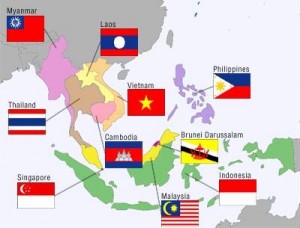 “One Vision, One Identity, One Community” is the motto of the Association of Southeast Asian Nations (ASEAN). Was that the case in 2011? The region was predictably under-covered by the US mainstream media. I tried my best to bring unique, insightful coverage of the region as best I could from afar, highlighting a different country or issue every post. However, I may be providing some on-the-ground reporting in 2012 if all goes according to plan, so stay tuned. The following is a review of the region’s political happenings for 2011.
“One Vision, One Identity, One Community” is the motto of the Association of Southeast Asian Nations (ASEAN). Was that the case in 2011? The region was predictably under-covered by the US mainstream media. I tried my best to bring unique, insightful coverage of the region as best I could from afar, highlighting a different country or issue every post. However, I may be providing some on-the-ground reporting in 2012 if all goes according to plan, so stay tuned. The following is a review of the region’s political happenings for 2011.
Summary of 2011
One of the biggest stories of the summer was the election of Yingluck Shinawatra as the first female Prime Minister of Thailand. Her election capped a remarkable comeback for her Pheu Thai party which, under a previous incarnation, saw its leader, and Yingluck’s brother, Thaksin, deposed in a coup no more than five years ago. Her victory was part of a much broader story about class struggle in Thailand, which had been underscored by street protests staged by supporters of both the Shinawatra’s and the opposition since Thaksin’s overthrow in 2006.
Events in the South China Sea seemed to vindicate scholar Robert Kaplan’s postulation that the area would be “the future of conflict.” The dispute over the Spratly Islands, claimed by six countries, intensified most acutely between China and Vietnam, who have an afflictive history of hostility with one another over territorial spats. Tensions appear to be ameliorating thanks in part to ASEAN’s intervention and calls for peace, but the South China Sea is one of the world’s hottest flashpoints at the moment and is worth keeping an eye on.
2011 is concluding on a sad and tragic note as the worst flooding in years has inundated the region from the Philippines all the way to Bangkok. Hundreds have died, thousands have been forced to flee or remain trapped in isolated areas, farm land has been destroyed, and livelihoods have been lost.
Most Unexpected Event
The ruling military junta in Myanmar established a civilian political party, predictably won elections held at the end of 2010 — elections which were boycotted by the main opposition — but then made a previously inconceivable overture to reformers by releasing 100 political prisoners. There are now plans to release hundreds more over the coming weeks and months.
Just recently, President Barack Obama announced that U.S. Secretary of State Hillary Clinton will visit Myanmar, the first American official to do so in five decades. This comes on the heels of a pronouncement by the country’s democracy icon, Aung San Suu Kyi, that her political party, the National League for Democracy, will re-register and stand in upcoming by-elections. In a recent piece, I posited that perhaps Burma was finally opening up to the world in the wake of pro-democracy movements all around the globe.
Person/Group of the Year
My group of the year for 2011 is the Red Shirts of Thailand, organized as the United Front for Democracy Against Dictatorship. The Red Shirts draw their base support from the poor, rural regions of the country, a demographic which for decades had been marginalized and shut out of the political process by the elites of Thailand. When populist Prime Minister Thaksin Shinawatra was overthrown in 2006, eventually being replaced by the opposition Democrat Party in December 2008, the Red Shirts took to the streets in protest. Despite several harsh crackdowns in which more than one hundred people were killed, the Red Shirts resolve never wavered. In July 2011, their favored candidate, Yingluck Shinawatra, was elected Prime Minister. Her resounding electoral victory was a testament to the unyielding pertinacity of the Red Shirt movement, which is sure to be studied and duplicated in other countries of the Global South. Here is a brief audio voice over I produced for the Foreign Policy Association’s Expert Minute series over the summer on the issue.
Forecast for 2012
Will Yingluck be able to politically survive her bungling of the flood response? She rose to the Premiership on a tidal wave of support from the poor, rural majority. Yet she allowed large swaths of farmland to be flooded in order to spare Bangkok, which was inevitably flooded anyway. It will be interesting if she pays a significant price for that in terms of political capital.
Will the latest Khmer Rouge tribunals finally bring closure to the darkest chapter in Cambodia’s history? The tribunal’s commencement has been hit by several delays due in large part to the current Cambodian government’s meddling. Ascertaining guilt is not an issue; we know what those on trial have done. But Prime Minister Hun Sen is a former Khmer Rouge cadre himself, now reformed, and has publicly questioned the need for the trials to go forward. The start of Case 002 has just begun in the last few days at the Extraordinary Chambers of the Courts in Cambodia (ECCC), and already tales of horror are being recounted by the prosecution team in vivid details. On trial are brother Number Two Nuon Chea, one-time head of state Khieu Samphan, and former Foreign Minister Ieng Sary.
There are several flashpoints to take note of as well. The South China Sea is one, but also worth following are two Islamic insurgencies taking place in the southern Philippines and southern Thailand.
There are many things to look forward to in Southeast Asia in 2012, I look forward to continue writing about them for FPB. Thanks for reading!